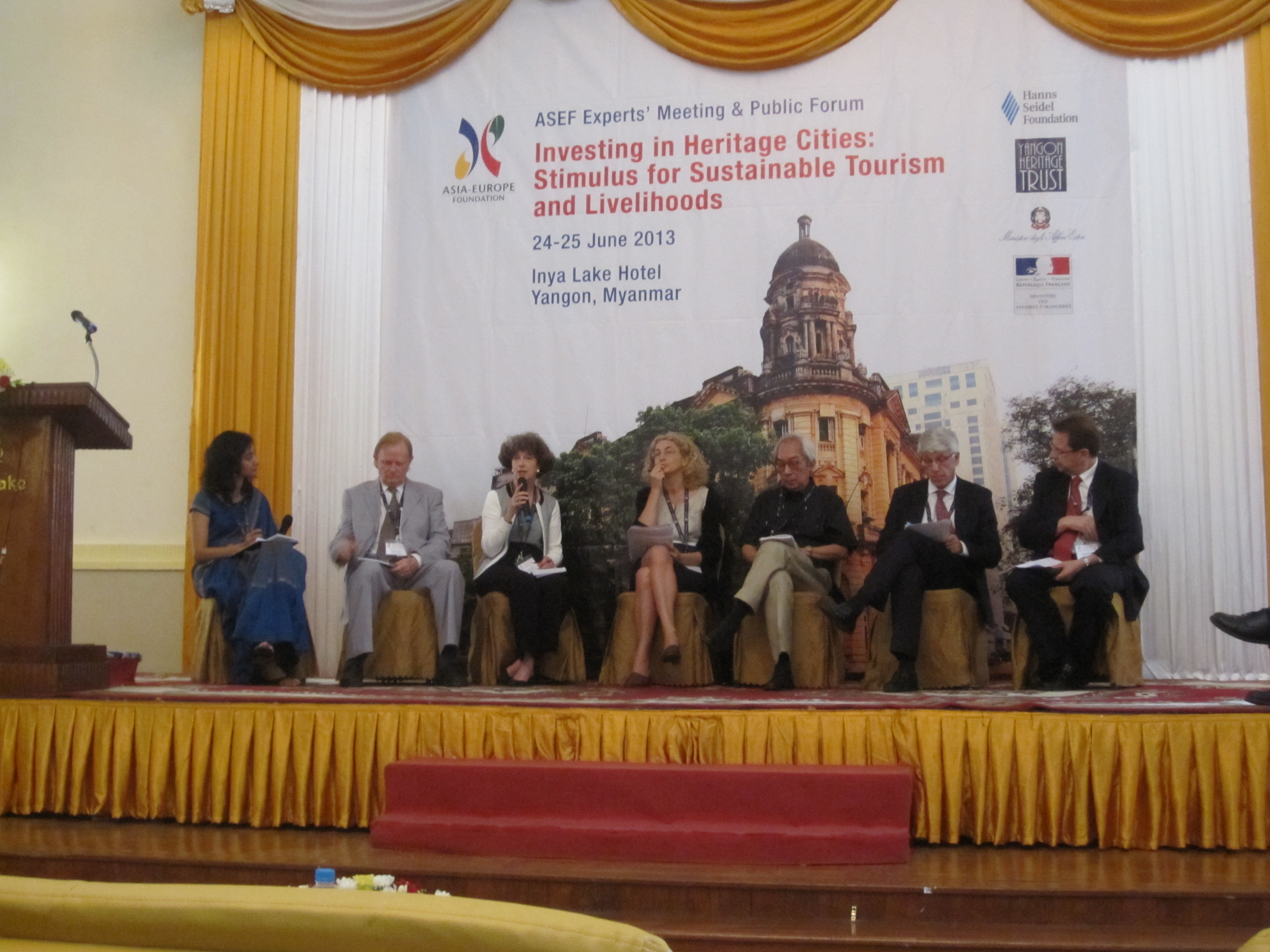Europa Nostra partner in new Asia-Europe Network on Heritage and Creative Economies
Europa Nostra has signed on as a founding partner in the new Asia-Europe Network of Urban Heritage for Sustainable Creative Economies. The need for an Asia-Europe network on heritage and creative economies emerged from the 5th Culture Ministers’ Meeting of the Asia-Europe Meeting (ASEM), which took place in 2012 in Indonesia, and the establishment of this new bi-regional network follows up on that idea. Europa Nostra will participate in setting this network in motion – a project for the coming six months to be funded by the Asia-Europe Foundation (ASEF). Other founding partners include the International National Trusts Organisation (INTO), the Indian National Trust for Art and Cultural Heritage (INTACH), the International Institute for the Inclusive Museum (IIIM) and the Yangon Heritage Trust.

ASEF Experts meeting in Myanmar in June 2013. Europa Nostra’s Council member Laurie Neale moderated a panel discussion during this gathering.
ASEF will share information about the new Asia-Europe network on heritage and creative economies during the Senior Officials for the Culture Ministers’ Meeting on 20 June 2014 in Rotterdam, hosted by the Dutch Ministry of Education, Culture and Science. It will be again presented when the actual ASEM Ministerial meeting will take place, also in Rotterdam on 19-21 October 2014. The theme of the 6th ASEM Culture Ministers’ Meeting is ‘Creative industries for society: talent, technology and trade’. This topic moves away from the theme of urban heritage management that dominated the Ministerial agenda from 2010-2012. However, cities are a new focal point for the discussions and the intersections between cities, heritage management and creative economy do feature on their agenda.
The first steps to establish the Asia-Europa Network of Urban Heritage for Sustainable Creative Economies were taken during the ASEF Experts meeting which took place in Yangon, Myanmar in June 2013. Europa Nostra was represented at this meeting by Council member Laurie Neale, who made a presentation and moderated a panel discussion. During the meeting entitled ‘Investing in Heritage Cities: Stimulus for Sustainable Tourism and Livelihoods’, conversations took place between the visiting heritage experts and the City of Yangon Planning Office about the challenges facing Yangon as Myanmar opens to the rest of the world, and as international investments and ambitions flood the city. Yangon is hoping to become a model of heritage-led sustainable development, with plans to concentrate new building projects in adjacent areas separate from the historical core. It was noted that a number of new companies hoping to invest in the city are interested in establishing their offices in heritage buildings they will restore. It was noted that many cities across Asia and Europe face such challenges, something the network will seek to address. A number of findings and recommendations from the expert meeting are included in the Summary Report.
The findings of the Yangon meeting built on recommendations of the ASEF Expert meeting entitled ‘Managing Heritage Cities in Asia and Europe: the Role of Public-Private Partnerships’, which took place in Yogyakarta, Indonesia, in July 2012. At this meeting, Laurie Neale presented 10 European case-studies of heritage management through Public-Private Partnerships. Observations and recommendations made during the meeting were summarised in a Report.
A publication by ASEF based on the results of both these expert meetings is due for release this autumn. It will include a set of 35 good practices on public-private partnerships in urban heritage management compiled from the presented case-studies and meeting conclusions. Also, a new mapping of good practices on creative industries in Asia & Europe is currently underway, commissioned by ASEF with the support of the Dutch Ministry of Culture.
About the Asia-Europe Foundation (ASEF)
The Asia-Europe Foundation (ASEF) is an international non-profit organisation based in Singapore established in 1997 by the countries of the Asia-Europe Meeting (ASEM). Its purpose is to promote mutual understanding and cooperation between the people of Asia and Europe through intellectual, cultural, and people-to-people exchanges. ASEF enhances dialogue, enables exchanges and encourages collaboration across the thematic areas of governance, economy, sustainable development, public health, culture, and education. It believes that bringing the Asian and European continents together in mutual dialog and exchange will ultimately contribute towards their common development and prosperity, as well as to world peace and stability. ASEF is the only permanently established institution of the Asia-Europe Meeting. ASEM is an interregional forum which consists of the 28 members of the European Union plus Norway and Switzerland, the European Commission, the 10 members of ASEAN, the ASEAN Secretariat, China, Japan, the Republic of Korea, India, Mongolia, Pakistan, Bangladesh, Russia, Australia and New Zealand.






